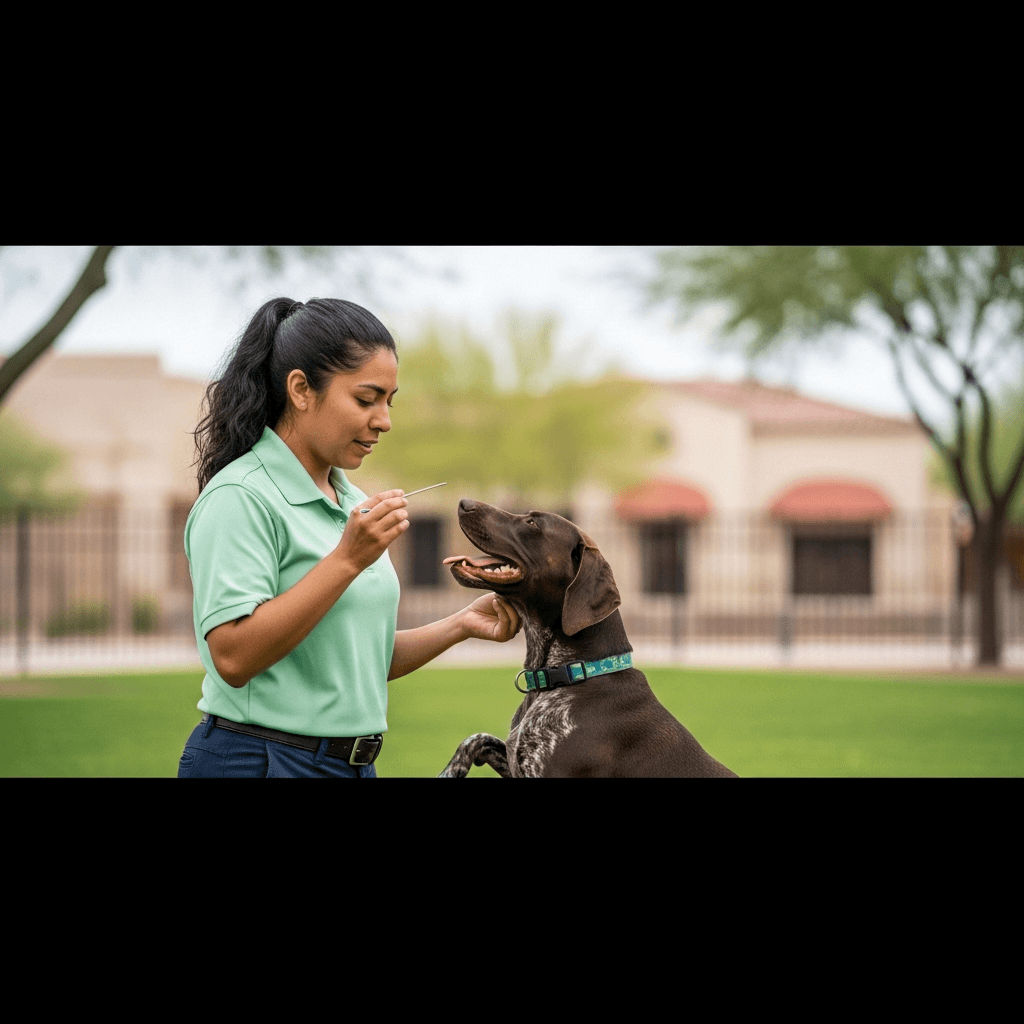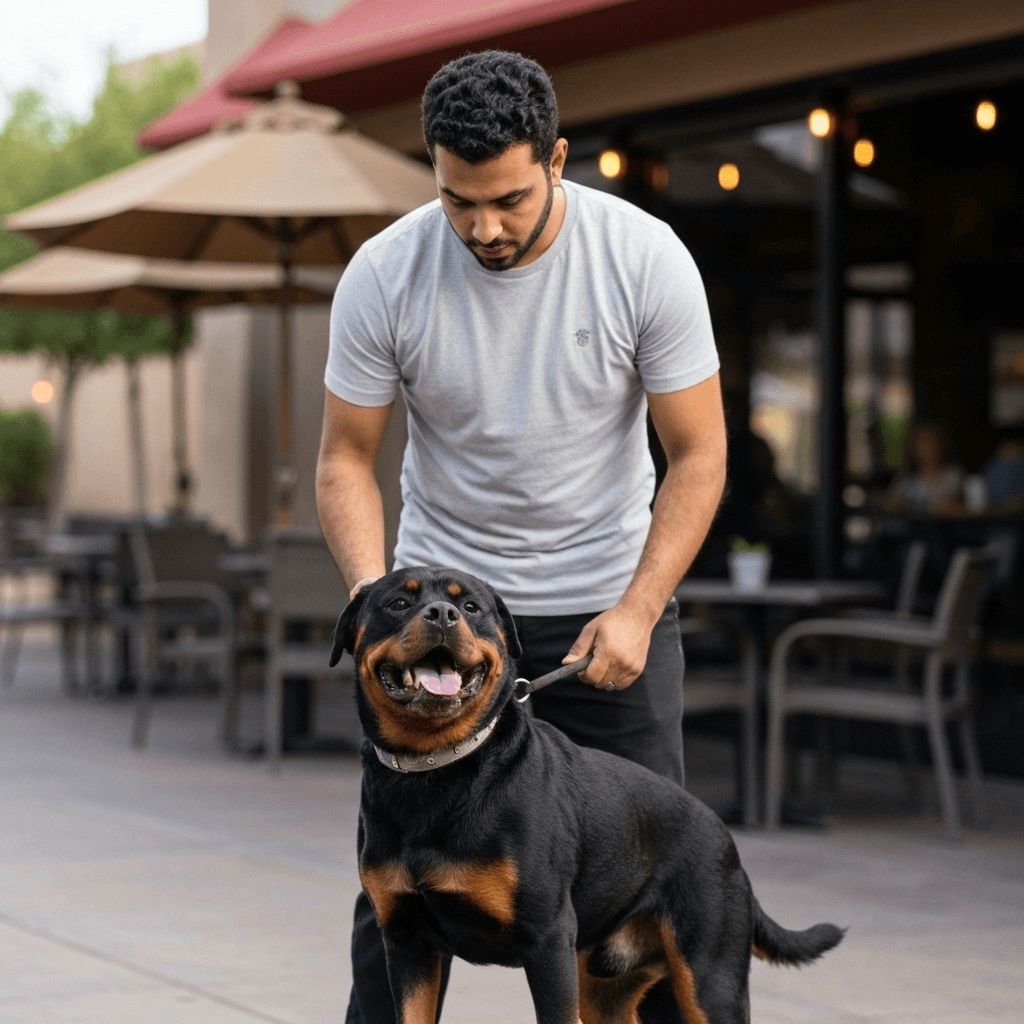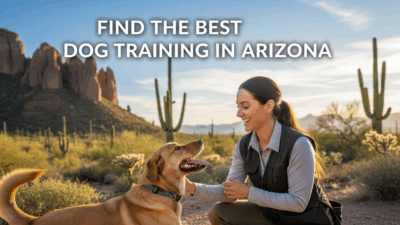Your Complete Guide to Choosing a Dog Trainer in Arizona
Finding the right dog trainer in Arizona means looking for someone who understands the state’s unique environment and lifestyle. Whether you live in Phoenix, Tucson, Flagstaff, or one of the smaller towns across the state, your dog needs to handle desert trails, intense heat safety protocols, urban sidewalks, and the wildlife encounters that come with living in the Southwest.
Arizona dog owners face specific challenges that generic training programs don’t always address. Your dog might need to stay calm around javelinas, coyotes, and rattlesnakes. They need reliable recall on vast open trails and solid leash manners in crowded snowbird-season shopping areas.
How to Choose the Right Trainer
Start by finding a professional dog trainer who uses positive reinforcement training and can build a custom program around your Arizona lifestyle. Your dog should learn to walk calmly despite desert distractions, stay focused near wildlife, and handle the seasonal influx of visitors in tourist-heavy areas.
Credentials help you quickly compare experience levels and training philosophies. Look for certifications like KPA-CTP, CPDT-KA, or IAABC-CDBC for behavior problems. If your dog shows serious aggression or fear issues, consider trainers with CBCC-KA or science-based programs like CTC.
In-home dog training works well for puppy manners, door greetings, and neighborhood leash skills specific to your area. Group classes make sense once your dog can focus around other dogs, but make sure the facility has proper cooling and doesn’t schedule sessions during dangerous heat hours.
Ask potential trainers about their experience with Arizona-specific challenges. Do they teach snake avoidance? Can they help with dogs who overheat easily? Do they understand how monsoon season affects training schedules?
Common Dog Training Methods Explained

Reward-based methods create the trust and reliability you need while building behaviors that last through Arizona’s seasonal changes and environmental challenges. These methods also help you meet local leash laws and keep your dog safe around wildlife.
Basic obedience covers sit, down, stay, place, recall, and leash training so your dog can handle trails, restaurant patios, farmers markets, and park visits without pulling or jumping on strangers.
Puppy training focuses on socialization, potty training, bite inhibition, crate comfort, and early leash skills. Starting early prevents bad habits and helps puppies adjust to Arizona’s indoor-outdoor lifestyle shifts based on temperature.
Behavior modification addresses fear, reactivity, resource guarding, and separation anxiety through careful desensitization and counterconditioning. For serious cases, look for trainers who collaborate with veterinary behaviorists.
Private lessons and in-home sessions let you customize training around your daily routines and your specific neighborhood challenges. Day training can speed up results when you’re short on time or need intensive work.
Dog training classes help your dog practice good manners around other dogs and people. The best programs screen participants carefully, provide adequate space, and teach calm behavior rather than just excitement.
Specialized training like service dog training or therapy dog training requires extra structure, public-access skills, and a very detailed step-by-step training program.
Avoid trainers who rely on fear, intimidation, or pain to get results. Humane methods are safer for everyone, create more reliable behaviors, and build the trust you need when your dog faces real dangers like venomous wildlife.
Average Cost of Dog Training in Arizona (Updated for 2025)
Prices across Arizona vary based on the trainer’s experience, session length, location, and whether you’re in a major metro area or a smaller town. Here’s what most Arizona dog owners are paying in 2025.
| Service Type | Average Cost (Arizona) |
|---|---|
| Puppy classes (4-6 weeks) | $150-$300 total |
| Group obedience classes (4-6 weeks) | $175-$325 total |
| Private lessons (60-90 min) | $100-$200 per session |
| In-home training packages (4-6 visits) | $400-$950 total |
| Day training (per week) | $475-$1,000 per week |
| Behavior consult for reactivity/anxiety (initial) | $150-$275 |
| Board and train (2-4 weeks) | $2,200-$5,000 total |
Expect to pay more in Phoenix, Scottsdale, and Tucson metro areas, while smaller communities may offer slightly lower rates. Rural areas might include travel fees for trainers who come from larger cities.
Make sure you understand what’s included in each package, how progress gets tracked, and whether the trainer offers a free consultation or free evaluation before you commit.
Questions to Ask a Potential Dog Trainer
- What training methods do you use, and how do you keep sessions positive and low-stress?
- What dog trainer certifications do you have, and do you complete continuing education like CPDT-KSA?
- How will you customize the program for my dog’s needs and Arizona’s environmental challenges?
- Do you offer in-home visits, dog training classes, or day training, and which approach fits my situation best?
- How will we measure progress and know when to increase difficulty?
- What are the total costs including any travel fees, and what’s your cancellation policy?
- Do you carry liability insurance, and can you provide proof?
- For behavior problems, will you work with my veterinarian or a veterinary behaviorist if needed?
- What should I practice between training sessions to help my dog keep improving?
- How do you adjust schedules and locations for Arizona’s seasonal temperature extremes?
Local Arizona Rules and Considerations
Arizona has state-level requirements and local ordinances that vary significantly by city and county. Understanding these rules helps you stay compliant and keeps your dog safe.
Leash laws vary by municipality throughout Arizona. Most cities require dogs to be leashed in public spaces except in designated off-leash dog parks. Phoenix, Tucson, Mesa, Chandler, Scottsdale, and most other incorporated cities enforce leash requirements in all public areas.
Arizona law requires current rabies vaccination for all dogs over four months old, administered by a licensed veterinarian. Your dog must wear a rabies tag, and records must be kept current. Check the Arizona Department of Health Services Rabies Information for current state requirements.
Dog licensing requirements differ by county. Maricopa County, Pima County, and most other counties require annual dog licenses, which typically require proof of rabies vaccination. Contact your county animal control office for specific requirements.
Barking and noise ordinances exist in most Arizona cities and can result in fines or legal action. Work with your trainer on alert barking and separation anxiety before complaints arise.
Arizona doesn’t require state licensing for dog trainers. However, trainers who board dogs as part of board and train programs may need to meet facility requirements and obtain proper business licenses. Always verify insurance coverage before starting any training program.
Many Arizona communities have specific ordinances about dangerous or aggressive dogs. If your dog has a bite history, work with a certified dog trainer who has experience with behavior modification and understands local reporting requirements.
Local Arizona Resources for Dog Owners
Arizona offers numerous locations where you can practice obedience training, work on socialization, and provide enrichment for your dog. Always follow posted rules and check seasonal hours, as many locations have restricted summer hours due to heat.
- Chaparral Dog Park in Scottsdale offers separate areas for small and large dogs with ramadas for shade and water stations throughout the space
- PetSmart Dog Park at Washington Park in Phoenix provides fenced areas with double-gated entries and is well-maintained for safe off-leash practice
- Christopher Columbus Park Dog Park in Tucson features separate small and large dog sections with shade structures and benches for handlers
Many Arizona State Parks allow leashed dogs on trails, including Slide Rock State Park, Red Rock State Park, and sections of Lost Dutchman State Park. These locations provide excellent opportunities to practice leash training and focus work around wildlife and other hikers.
The Arizona Humane Society and Pima Animal Care Center both offer resources for dog owners including low-cost vaccination clinics and behavior resources.

FAQs
How much does in-home dog training cost?
Most Arizona trainers charge $100-$200 per in-home visit, with package discounts available for multiple sessions. Behavior modification work and aggressive dog training typically start at the higher end of that range.
Is in-home dog training worth it?
Yes, because you address problems exactly where they happen. Your trainer can fix door manners, jumping on guests, counter-surfing, and yard reactivity in your actual home, then practice leash skills on your neighborhood sidewalks with real-world distractions like other dogs and wildlife.
Can you pay someone to house train your dog?
Yes, many trainers offer puppy training programs that include potty training, crate routines, and daily schedules. Day training can speed up the process significantly while teaching you how to maintain the results.
What is the 3-3-3 rule for dog training?
This timeline helps set realistic expectations for new or adopted dogs: expect about 3 days for your dog to decompress, 3 weeks to learn your routines, and 3 months to feel completely settled. Good training programs work with this natural adjustment period rather than against it.
How long will it take to reach my training goals?
Most puppies and friendly adult dogs show solid progress within 4-8 weeks if you practice daily. Fear, reactivity, or aggression typically requires several months of careful behavior modification with gradual increases in difficulty.
What should I bring to group classes?
Pack a flat collar or harness, a 6-foot leash, high-value treats, water for both you and your dog, and current vaccination records if your trainer requests them. Leave retractable leashes at home for safety reasons.
What’s the leash law in Arizona?
Leash laws vary by city and county. Most incorporated cities throughout Arizona require dogs to be leashed in all public spaces except designated off-leash areas. Check with your local city or county animal control for specific requirements.
Do I need a dog license in Arizona?
Most Arizona counties require annual dog licenses. Maricopa County and Pima County both have mandatory licensing that requires proof of current rabies vaccination. Contact your county animal control office to register your dog and get current fee information.
What shots does my dog need in Arizona?
Arizona requires rabies vaccination for all dogs over four months old. Your veterinarian may recommend additional vaccines like distemper-parvo combination and bordetella based on your dog’s lifestyle and exposure risks. Check the Arizona Department of Health Services website for current state requirements.
Are dog trainers required to be licensed in Arizona?
Arizona doesn’t require state licensing specifically for dog trainers. Trainers follow normal business regulations, but those who offer board and train services may need facility licenses depending on local requirements. Always verify that your trainer carries liability insurance.
Where can I practice off-leash recall?
Use fenced dog parks throughout Arizona to practice recall safely and legally. Visit during cooler morning or evening hours, especially in summer months. Start during quieter times when fewer dogs are present.
Which dog parks allow training around Arizona?
Most public dog parks allow training for dogs as long as you follow posted rules and don’t interfere with other users. Popular options include Chaparral Dog Park in Scottsdale, PetSmart Dog Park at Washington Park in Phoenix, and Christopher Columbus Park Dog Park in Tucson.
What beaches or trails allow dogs for training?
Arizona doesn’t have ocean beaches, but many state and local parks allow leashed dogs on trails. Papago Park in Phoenix and Tempe, Sabino Canyon in Tucson, and trails at Prescott National Forest all welcome leashed dogs and provide great opportunities for training sessions around natural distractions.
How do I find a well-behaved dog trainer near me?
Look for expert dog trainers with verifiable certifications, positive online reviews, clear training philosophies, and experience with your specific needs. Ask for references and request a free evaluation to see if the trainer’s style fits your goals before committing to dog training services.
What should I do about snake encounters during training?
Arizona is home to rattlesnakes and other venomous species. Many trainers offer specialized snake avoidance training to help your dog learn to retreat from snakes rather than investigate. This training can be lifesaving and is worth considering if you hike or live near natural desert areas.
Can trainers help with coyote encounters?
Yes, trainers can teach your dog reliable recall and focus work that keeps them safe during wildlife encounters. They can also help you develop management strategies for your yard and walks to minimize dangerous interactions with coyotes and javelinas.
The right combination of thorough research, humane training methods, and consistent practice will help your dog become a confident, well-behaved companion ready for Arizona’s unique lifestyle. Finding a top dog trainer who understands both positive reinforcement and the specific challenges of living in Arizona makes all the difference in reaching your goals.
